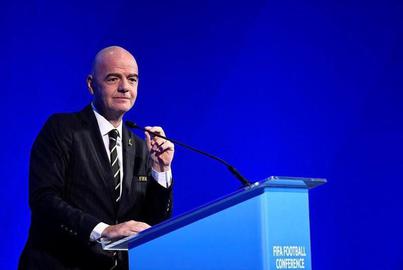As the October 12 match between Iran and South Korea fast approaches, international football federation head Gianni Infantino has expressed hope that Iranian and global officials can reach an agreement on two key issues: the widespread debate over video referee assistance (VAR) and the decades-long argument about women being allowed into stadiums, an ongoing preoccupation of particular significance for Iranian sporting authorities.
For the international football body FIFA, the recent meeting between Shahabuddin Aziz Khadem, the president of the Iranian Football Federation, and Infantino was about one thing: sending a clear message to the Islamic Republic that it will not back down from its support and promotion of women’s rights.
A History of the Crisis
One relatively recent key event that symbolizes the clash between politics and religious extremism was the death of Sahar Khodayari, dubbed the Blue Girl, in 2019. She gained international notoriety after setting herself on fire in protest against women being banned from attending sports events alongside Iranian male fans.
In March 2019, Sahar Khodayari arrived at Tehran’s Azadi Stadium in the hopes of watching the Asian Champions League match between Esteghlal and Al-Ain. Police arrested her and she spent three days in custody while her family raised a bail amount of 50 million tomans. Upon her release, she was given a court order to attend a hearing in September the following year. But on the day of the trial, the judge failed to turn up, and Khodayari was told in the corridors of the courthouse that she was going to be sentenced to between six months and two years’ imprisonment.
As she emerged from the courthouse, she covered herself in gasoline and set herself on fire. Her sister explained that Sahar Khodayari had been suffering from bipolar disorder, and that this fact had been reported to the court along with the presentation of her medical records on a number of occasions. News of her death shocked the world.
Iranian women were banned from entering stadiums following the 1979 revolution. But the controversial ruling was not initially determined by Shia sources of emulation or government institutions: it was the lower management of Shiroudi Stadium that decided back in 1980 that the doors of the stadium should remain closed to women and girls. Since that time, Iran’s Physical Education Organization has kept a ban in place.
In fact, the ban on women in sports venues, like the ban on Iranians competing against Israeli athletes, was based not on religious rulings or political decisions, but on personal opinion. And yet these extreme policies survive to this day, and have become part of Iran's football identity and even of a wider political-religious ideology.
The Blue Girl: A Turning Point
But the death of Sahar Khodayari put into sharp focus the drastic repercussions of that extreme policy, and it prompted FIFA to take action.
On September 22, 2019, FIFA stepped up its pressure on Iran, and said its representatives based in the country would be assessing the crisis, releasing a statement urging Iran to take immediate steps to ensure women were allowed in stadiums without restrictions. It gave a deadline of Iran’s first World Cup qualifier in Tehran in October of the same year.
One month later, Massoud Soltanifar, the then Minister of Sports for the Islamic Republic, gave an interview with the state-run Iran-e Varzeshi newspaper, during which he claimed that FIFA had issued no ultimatum and that only 10 percent of Azadi stadium seats had been allocated to women.
Mehdi Taj, who was at the time president of the Football Federation, also claimed that FIFA's “request” only applied to national games and that the international federation would not interfere in Iran's internal affairs.
IranWire contacted FIFA to set the record straight. FIFA officials said it was against Iran’s decision to restrict the number of women in the stadium, and had made its demands clear: that women fans should be allowed in all stadiums for all competitions, for any sport and regardless of whether they were played at the national or international level.
But only a limited number of Iranian women were allowed to in Azadi Stadium. There were also reports of police cracking down on girls who had gone to the stadium, making arrests and in some cases detaining women and taking them to desert areas around the capital before releasing them.
"I was scared," one of the young women who was abandoned by police outside Tehran told IranWire. "It was dark everywhere. I went to one of the lady officers and begged her to take us back to the bus. I said I would never come to the stadium again. She grabbed my arm with her nails and squeezed it, ordering me to stay there and die.”
The Pandemic “Saves” Iran
But then the Islamic Republic and its anti-women policies were given an unexpected reprieve from FIFA's pressure: the coronavirus pandemic. In March 2020, all spectators were banned from stadiums in Iran. Following this, on April 17, FIFA vice president Victor Montagliani said "national matches being run under FIFA administration are canceled. We will review again in September. Medical community and scientists are making decisions about the immediate future, not us.”
Coronavirus devastated Iran, so far claiming at least 113,000 lives, causing serious illness for many thousands more and crippling the economy. But for the Iranian football federation, and for all politicized sport in the republic, it was a blessing. It saved Iranian football and other sports from indefinite suspension.
In May 2021, the European Champions League welcomed a maximum of 9,500 spectators to the championship final provided they had been vaccinated. Limited numbers of fans who had been given two doses of the vaccine were also allowed into stadiums to watch competitions in a range of European stadiums.
Ahead of his election as president later that month, on June 4, 2021, Fars news agency quoted Ebrahim Raisi, who was head of the judiciary at the time: "Does women being present at men's competitions solve any problem for society and for the women of Iran?"
Now Gianni Infantino and FIFA are back with their firm ultimatum. Infantino says he is waiting for the doors of Azadi Stadium to be reopened to Iranian women on the day Iran meets the South Korean team on October 12 at Azadi Stadium in Tehran.
However, the Covid-19 pandemic continues to pose a huge threat to Iran, so it’s unlikely that spectators will be allowed to attend Azadi on public health grounds. The speed of Iran’s vaccination roll-out has not given any hope that the country’s young will be vaccinated in time, and the number of people with the virus has not decreased in any significant manner.
Nonetheless, Gianni Infantino's remarks reveal an urgency. Almost two years after the dispute between Iran and FIFA reached its peak, FIFA is once again reiterating its demand that Iran grants women fans their legitimate right to attend sporting events.
As the ultimate authority over the Iranian Football Federation, President Raisi now has a decision to make. But it’s becoming clearer by the day that his options are limited. If he does not follow FIFA’s orders, the Islamic Republic will become the first country to play football without spectators on a permanent basis.
Related coverage:
Iran's Supreme National Securtiy Council and the Death of the Blue Girl
Iranian Women's 15-Year Fight to Enter Stadium
Iran's Ban on Female Journalists Entering Stadiums
The Corrupt Iranian Football Official Testing FIFA's Patience

























comments